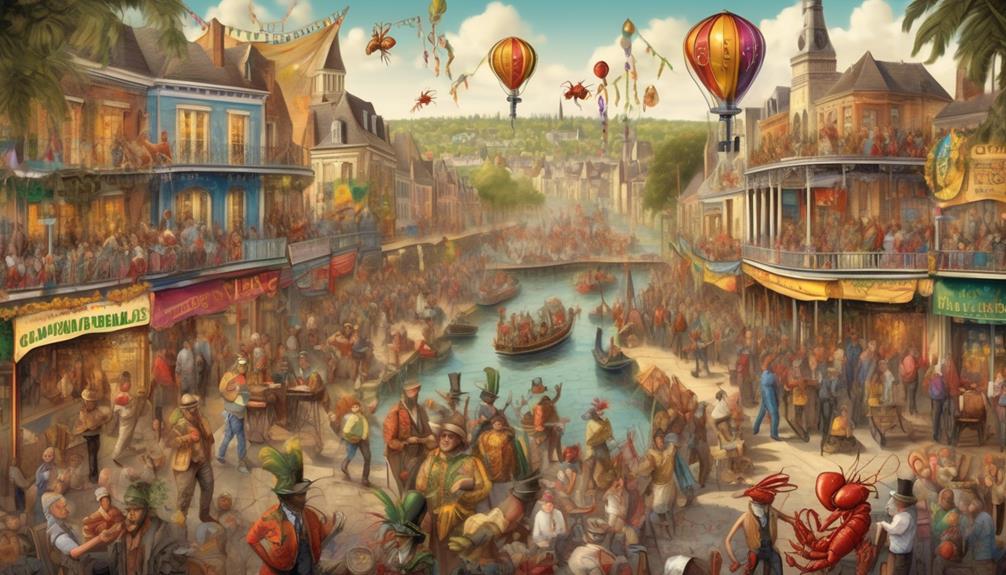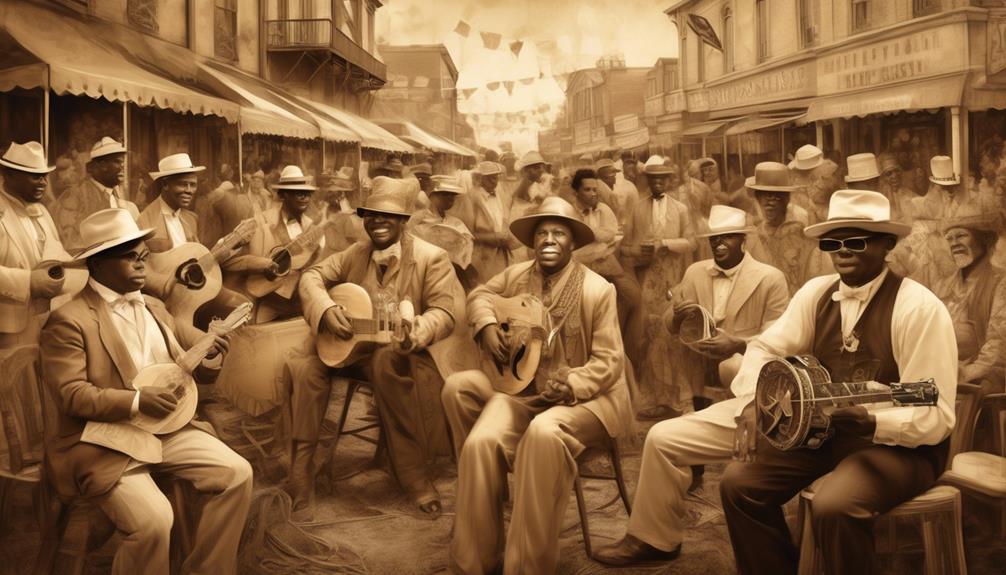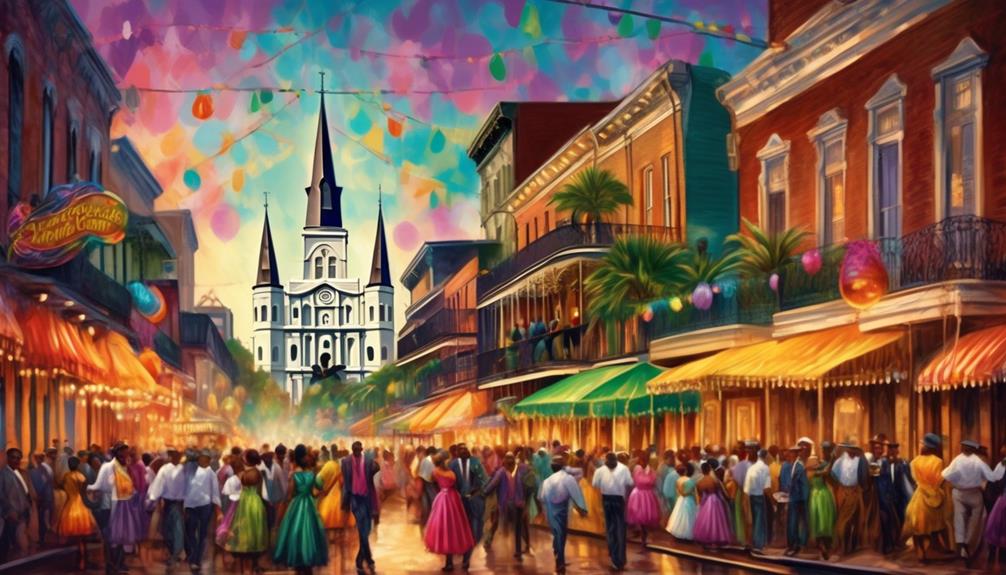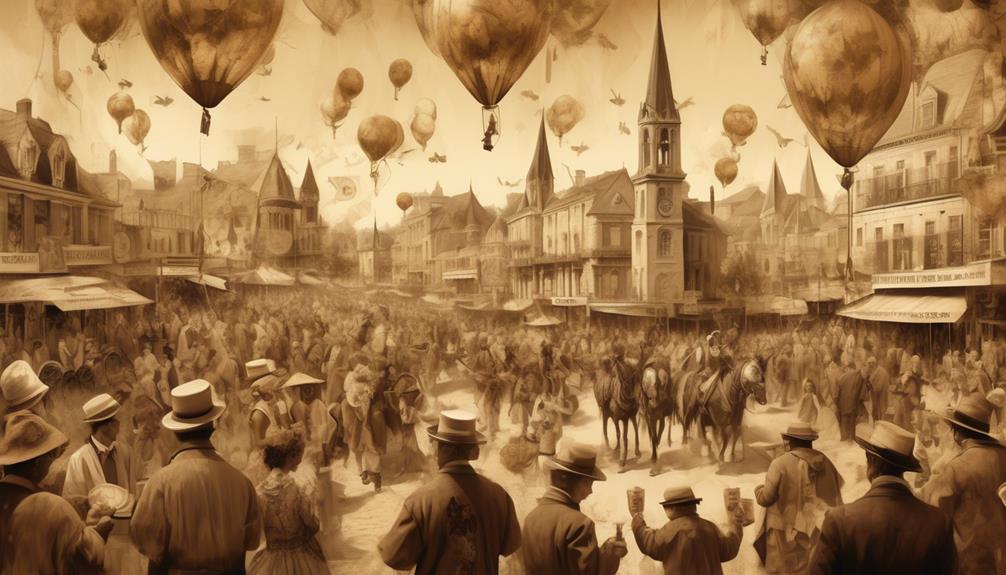
Imagine standing on the precipice of a cultural goldmine, a vibrant, musical tapestry woven over decades of spirited celebration and resilience. This, dear reader, is the experience of tracing the roots of the Orleans' Heritage Festival.
As you journey through a rich history that dances to the rhythm of jazz, blues, and ragtime, you'll uncover a story that is as diverse and vibrant as the city of New Orleans itself.
From its humble beginnings in the 1960s to its growth into a world-renowned event, the festival is not just a celebration of music but a testament to the city's enduring spirit.
But what factors contributed to its inception? And how did it evolve to become the cultural powerhouse it is today? To understand these, we have to journey back in time and explore the elements that shaped the festival's unique identity.
Key Takeaways
- The New Orleans Jazz Fest was born in 1970, overcoming racial segregation and financial struggles, and is now officially known as the New Orleans Jazz & Heritage Festival.
- The festival's evolution reflects the diverse influences shaping jazz in Louisiana, including contributions from African-Americans, French, Spanish, and Caribbean peoples.
- Influential artists such as the Neville Brothers, Louis Armstrong, and Buddy Bolden have shaped the festival's identity and continue to resonate through their performances.
- The festival is a significant economic engine for the local community, attracting visitors who support local businesses and creating job opportunities for musicians, vendors, and event staff.
Birth of New Orleans Jazz Fest
In the vibrant year of 1970, the New Orleans Jazz Fest was born, a testament to the resilience and rich culture of the city, in collaboration with George Wein, the renowned organizer of the Newport Folk Festival. This marked the birth of the first jazz festival in the city, which came to life amidst the challenges of racial segregation and financial struggles.
The New Orleans Jazz & Heritage Festival, as it's officially known, is more than just a celebration of music. It's a showcase of the deep-seated traditions that make New Orleans unique. Despite hurdles like Hurricane Katrina, the Jazz Fest has remained a beacon of resilience, a characteristic deeply ingrained in the city's DNA.
Over the decades, the Orleans Jazz and Heritage Festival has seen performances from some of the most notable artists in the music industry, further cementing its reputation as a premier event. As you immerse yourself in this vibrant celebration of music and culture, you're not just attending a festival, you're partaking in a legacy.
The Jazz Fest embodies the spirit of New Orleans, a city that refuses to be silenced, a city that dances to the beat of its own drum.
Festival's Evolution Through Decades
As you delve deeper into the rich tapestry of the Orleans Jazz and Heritage Festival, you'll notice how its evolution over the decades reflects the diverse influences shaping jazz in Louisiana. The festival's journey showcases the melting pot that's Louisiana's population. The African-Americans, French, Spanish, and Caribbean peoples each added their unique touch, creating a vibrant and unique sound.
This rich history of cross-cultural influences had a profound effect on the evolution of jazz in Orleans, with the Creole community playing a pivotal role. The influence of African rhythms and the Blues, deeply rooted in the African American community, significantly shaped the jazz we hear today.
Brass bands, a staple of Orleans' musical landscape, along with the infamous Storyville's red light district, played a crucial role in the development and spread of jazz. But it wasn't just about the music. The festival evolved amidst financial struggles, growth, a commitment to musical integrity, and the devastating impact of Hurricane Katrina.
Moreover, the festival became a platform for modernizing traditional jazz, reflecting the spirit of resilience and the Civil Rights Movement's impact. So, as you explore the Orleans Heritage Festival, you're experiencing a vibrant showcase of jazz's evolution.
Influential Artists and Performances

Through the years, you've seen a plethora of influential artists grace the Orleans Heritage Festival stage, each leaving an indelible mark on its history. They've rocked the French Quarter with their vibrant jazz tunes, adding to the festive atmosphere.
- Let's start with the Neville Brothers. They're a household name in the world of jazz and a staple of the festival. You've seen them weave magical musical tapestries with their soulful tunes, deeply embedding themselves in the festival's culture.
- Then there's Louis Armstrong. He's not just a name, but a legend. His performance at the festival is something you'd recount to your grandchildren years later. His trumpet's sound, echoing through the French Quarter's narrow lanes, is an unforgettable festival memory.
- The list wouldn't be complete without mentioning Buddy Bolden. His innovative jazz style has greatly influenced the festival's music scene. His performance has been a festival highlight, drawing enthusiastic crowds and creating a unique vibe.
These artists have shaped the festival's identity, and their performances have made it what it's today. Their music still resonates in the streets of the French Quarter, keeping the festival's spirit alive.
Festival's Impact on Local Economy
You mightn't realize it, but the New Orleans Jazz & Heritage Festival isn't just a music lover's paradise; it's also a significant economic engine for the local community. This event, spearheaded by George Wein, the same impresario behind the Newport Folk festival, ranks as one of the United States' most profitable festivals, and its impact on the local economy is impressive.
Every year, the festival attracts hordes of visitors, whose spending power fuels local businesses, hotels, and restaurants. It's a revenue generator that's hard to ignore. But the festival's impact extends beyond direct spending.
It also creates job opportunities, employing musicians, vendors, and event staff. That's not to mention the boost in tourism it brings, promoting New Orleans as a cultural hotspot. This increased visibility stimulates the local economy, making the city an appealing destination year-round.
Moreover, the festival's success and continued growth have led to its expansion, ensuring a sustained economic impact on the local area. So, the next time you're enjoying the vibrant music and culture of the festival, remember you're also supporting a thriving local economy.
The Role of Food and Crafts

Let's dive into the rich tapestry of New Orleans' cultural heritage, celebrated through the enticing food offerings and diverse crafts showcased at the festival. You'll find the city's tricentennial and cultural diversity reflected in every bite and artifact on display.
Imagine tasting traditional dishes inspired by the Mardi Gras Indian culture, each plate serving a story of the city's culinary heritage. The blend of flavors introduces you to the melting pot of cultures that have shaped New Orleans.
Wander to Congo Square, where artisanal crafts reflect the city's multicultural influences. Whether it's a handmade necklace or a carefully sculpted mask, each craft represents a piece of the city's artistic traditions.
Don't miss out on the Eureka Brass Band's performance, their vibrant melodies perfectly accompanying the feast for your senses. The heart-stirring second line and Cajun music are more than entertainment—they're a tribute to the city's musical roots.
The festival's food and crafts aren't just for show—they're a platform to celebrate and preserve New Orleans' unique cultural heritage, fostering an appreciation for the city's roots.
Jazz Fest's Cultural Significance
Building on the rich cultural tableau of food and crafts, the Jazz Fest's significance shines through its unique musical tradition, steeped in the diverse influences of Louisiana's population. It's more than a celebration of music; it's a testament to the resilience and vibrant culture of New Orleans.
Imagine the early days with Jelly Roll Morton, a key figure in the development of jazz, playing his original blend of ragtime and blues. Fast forward to the modern tunes of Trombone Shorty or the soul-stirring ensemble of the Rebirth Brass Band, and you'll experience the jazz fest's cultural significance.
Hurricane Katrina may have battered the city, but it couldn't silence its music. The Jazz Fest became a beacon of hope, a symbol of the city's indomitable spirit, and a rallying point for recovery. It's a platform where the city's musical heritage is proudly displayed, celebrated, and passed on to the next generation.
Challenges and Triumphs Over Years

Amid challenges and triumphs over the years, the Jazz Fest has persistently echoed the unique sound of jazz, a testament to the rich tapestry of cultures in Louisiana. It's been a bumpy ride, but you've managed to keep the spirit alive, and in doing so, you've created a great place for music lovers to gather and celebrate.
Over the past 39 years, you've seen a wide range of artists grace your stages, from local talents to international superstars like Lionel Richie. In recent years, you've faced various hurdles, from financial constraints to unpredictable weather. But, here's what you've done to overcome them:
- You've fostered relationships with local businesses and sponsors to ensure financial stability.
- You've diversified your lineup to appeal to a broader audience, effectively growing your fan base.
- You've implemented contingency plans to deal with unforeseen circumstances, such as weather-related issues.
Through it all, you've remained steadfast in your mission to showcase the rich cultural heritage of Louisiana. As a result, the Jazz Fest continues to thrive, embodying the resilience and vibrant spirit of the community it represents.
Future of New Orleans Jazz Fest
As you gaze into the future of the New Orleans Jazz Fest, there's an undeniable sense of optimism, despite the festival's past challenges and criticisms. It's one of the leading music festivals in the world, with a reputation for showcasing a diverse blend of genres, from rock 'n roll to jazz.
Last year, despite some weather challenges, the festival continued to attract big name artists from around the globe, further cementing its status. The inclusion of artists from as far as Nova Scotia illustrates the Jazz Fest's commitment to embracing a broad musical landscape.
Looking ahead, the festival's partnership with AEG, one of the leading live entertainment companies, suggests a promising future. There's a drive to maintain the festival's musical integrity while expanding its reach. Critics may argue that the festival is drifting from its indigenous roots, but the organizers are keen on balancing the celebration of New Orleans' cultural heritage with the need for growth and evolution.
Make no mistake, the New Orleans Jazz Fest is here to stay. Its resilience, despite past hurdles, signals a future filled with more music, more diversity, and more unforgettable experiences.
Frequently Asked Questions
Who Started the New Orleans Jazz and Heritage Festival?
You're asking who started the New Orleans Jazz and Heritage Festival. It was started by local tourism officials in collaboration with George Wein, the organizer of the Newport Folk Festival, back in 1970.
What Type of Music Has Its Roots in New Orleans?
Jazz music has its roots in New Orleans. It's influenced by African rhythms, French, Spanish, and Caribbean cultures. Blues, ragtime, and brass bands also played significant roles in developing this improvisational genre.
Where Is the Birthplace of Jazz New Orleans?
Yes, you're correct. The birthplace of jazz is indeed New Orleans, Louisiana. It's here where this unique music genre was born from a fusion of African, French, Spanish, and Caribbean cultural influences.
What Is the Location of the New Orleans Jazz Festival?
You'll find the New Orleans Jazz Festival at the Louisiana Fairgrounds. It's a vibrant celebration of the city's tricentennial, showcasing the cultural diversity that has shaped New Orleans over three centuries.
Conclusion
So, you've danced through the birth and evolution of New Orleans Jazz Fest, witnessed its impact and savored its rich cultural significance.
You've shared tears and triumphs, tasted its soulful cuisine and admired the craftwork.
Now, as the sun sets on the festival's storied past, you're left standing at the dawn of its promising future.
Orleans' Heritage Festival, like jazz itself, is a testament to resilience, evolution, and the unyielding spirit of New Orleans.
